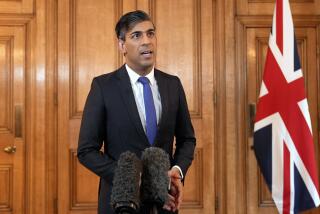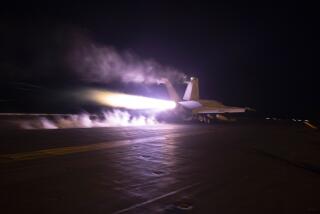Britain calls its first airstrikes against Islamic State successful
Britain conducted its first airstrikes against the Islamic State extremist group on Tuesday, hitting two targets in northwest Iraq, British officials announced.
Strikes by the Royal Air Force successfully took out a heavy weapons post and a nearby armed pickup truck, the Ministry of Defense said in a statement.
It said the strikes took place “in the course of an armed reconnaissance mission” and were in support of Kurdish troops who were being attacked by fighters of the self-styled caliphate.
“This action is part of the international coalition’s operations to support the democratic Iraqi government,” the Defense Ministry said.
On Friday, British lawmakers overwhelmingly approved carrying out airstrikes against Islamic State in Iraq but not in Syria, where the U.S and its Arab allies have been conducting strikes since last week. The same day, Belgium and Denmark also committed warplanes to the U.S.-led air campaign in Iraq.
In making the case for Britain to join the conflict in Iraq, Prime Minister David Cameron told lawmakers Friday that Islamic State posed a direct threat to the nation.
“Left unchecked we will face a terrorist caliphate on the shores of the Mediterranean and bordering a NATO member, with a declared and proven determination to attack our country and our people,” he said.
Meanwhile, in Syria, opposition to U.S. airstrikes seems to be growing among rebel groups and their backers.
Since the strikes began last week, opposition activists have staged protests and denounced the U.S. air assault, calling it misguided and an attack on Islam. Critics say the bombardment should be aimed at forces loyal to the government of President Bashar Assad, not his opponents.
Special correspondents Christopher Werth and Nabih Bulos and Times staff writers David S. Cloud and Patrick J. McDonnell contributed to this report.
For more news, follow @raablauren on Twitter
More to Read
Sign up for Essential California
The most important California stories and recommendations in your inbox every morning.
You may occasionally receive promotional content from the Los Angeles Times.











